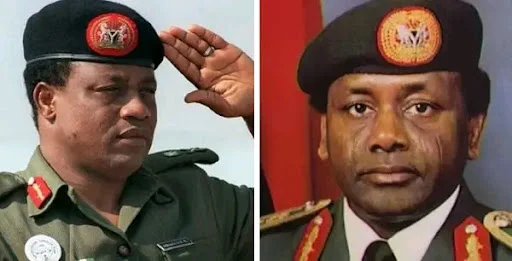History has a way of repeating itself, and if there is one Nigerian who has perfected the art of political deception, it is General Ibrahim Badamasi Babangida. Once again, Nigeria’s self-styled "evil genius" has tried to rewrite history, dribbling Nigerians one last time in his recently released autobiography, A Journey In Service.
For decades, Babangida has danced around the truth about the annulment of the June 12, 1993, presidential election—the freest and fairest in Nigeria’s history. The election, won by Chief Moshood Kashimawo Olawale (MKO) Abiola, was expected to usher in a new era of democracy after years of military dictatorship. But instead of handing over power, Babangida shocked the nation by annulling the election, throwing Nigeria into chaos and setting the stage for General Sani Abacha’s brutal dictatorship.
Now, in A Journey In Service, Babangida attempts one last dribble, blaming Abacha for the annulment and painting himself as a helpless leader forced to act against his will. But is anyone buying this story?
Babangida’s Old Game: The Blame Strategy
Since stepping down from power in 1993, Babangida has played the same game—shifting responsibility, dodging accountability, and manipulating the narrative to make himself appear as a victim rather than the architect of Nigeria’s greatest electoral betrayal. His latest book follows the same script:
1. He insists the election was free and fair.
2. He claims he had planned to transition to democracy.
3. He blames “security concerns” for the annulment.
4. And now, he points the finger at Abacha.
This is classic Babangida. Over the years, he has mastered the art of deception, earning him the nickname Maradona for his ability to outmaneuver opponents and manipulate situations to his advantage. But this time, his dribble might be his last, as Nigerians have grown weary of his political gymnastics.
The Truth Babangida Won’t Admit
While Babangida would like Nigerians to believe that he was pressured into annulling the election, the reality is far different. If anything, his eight-year rule was built on deception, self-preservation, and a deep fear of losing power.
The real reasons for the annulment were not security concerns but a combination of political selfishness, ethnic and regional calculations, and a desire to maintain military control. Here’s what Babangida won’t admit:
Fear of Abiola’s Independence: Unlike past civilian leaders who were often controlled by the military, Abiola was his own man, wealthy, influential, and not easily manipulated. His presidency would have reduced military influence and possibly exposed the corruption within Babangida’s government.
Northern Power Politics: Abiola, a Yoruba Muslim from the South West, was about to break the cycle of northern dominance in Nigerian politics. Some northern elites were uncomfortable with this shift and pressured Babangida to act.
Babangida’s Own Survival: He knew that once he handed over power, he would become vulnerable. He feared investigations into his government’s financial dealings, especially the missing $12.4 billion Gulf War oil windfall, which has remained a mystery to this day.
Babangida’s latest trick is to pin the blame on Abacha, a man already loathed by many, especially in the South West. But why now? Why didn’t he say this when Abacha was alive? The answer is simple: Babangida understands the deep hatred the Yoruba people have for Abacha, who not only upheld the annulment but also imprisoned and possibly orchestrated the death of Abiola. By shifting the blame to Abacha, Babangida hopes to absolve himself and regain some favor, particularly in the South West, where his name remains a symbol of betrayal.
But Nigerians are not so easily fooled. If Babangida were truly against the annulment, why did he not resist? Why did he, as Commander-in-Chief, allow himself to be “forced” into making such a monumental decision? The truth is, Abacha may have been ambitious, but it was Babangida who signed the annulment order, Babangida who defended it at the time, and Babangida who ran away from power when he realized he could no longer control the situation.
The Consequences of Babangida’s Deception
The annulment of June 12 did not just deny Abiola his mandate—it plunged Nigeria into one of its darkest political crises. Protests erupted nationwide, the economy suffered, and the international community condemned the military government. Civil liberties were crushed, and many activists were arrested, killed, or forced into exile.
Babangida’s failure to transition to democracy left a vacuum that Abacha quickly filled. Under Abacha, Nigeria witnessed unprecedented brutality—opposition figures were assassinated, journalists were jailed, and Abiola himself was arrested and later died under suspicious circumstances. In many ways, Abacha’s rise was Babangida’s creation. If Babangida had allowed a smooth transition, Abacha would never have seized power.
Babangida’s attempt to rewrite history in A Journey In Service is nothing new. For years, he has tested the intelligence of Nigerians, hoping they would one day accept his version of events. But this time, his dribble is failing.
No matter how many books he writes, the truth remains: Babangida annulled the June 12 election. He betrayed democracy. He plunged Nigeria into political turmoil. And no amount of finger-pointing will change that.
If this is Babangida’s last dribble, then it is one he has lost. Nigerians have read the game, and this time, they are not falling for the trick.
Tags
Corridors of Power



